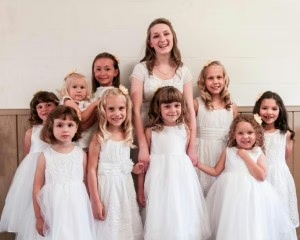Many faithful young women in our time rightly discern that the modern feminist project rejects the divine order of family and the sanctity of motherhood. They long instead for the goodness that God ordained from the beginning—for a home, for children, for the love of a husband, and above all, for the honor of Christ.
In an age that prizes self-sufficiency over communion, these women choose the harder, holier path: to live as those who receive their callings not from the world but from the Lord.
Headship and the Covenant Order
The Anglican tradition has always upheld the order of headship within the covenant of grace. Our marriage rite, drawn from Holy Scripture, declares, “The husband is the head of the wife, even as Christ is the head of the Church.” Yet this headship is not tyranny but type—the husband bearing the image of Christ who loves, nourishes, and gives himself for His Bride. Likewise, the father exercises a covenantal stewardship under God. When the priest asks, “Who giveth this woman to be married to this man?” the church acknowledges that the daughter comes from under one head to another, as the father yields what God had entrusted to him into the keeping of her husband.
This pattern is no mere social convention but a reflection of divine order: the Father gives the Bride to the Son through the Spirit. Every Christian household is thus a miniature of that Trinitarian life of love and obedience.
The King’s Daughter and the Queen in Gold
Psalm 45 gives us a glimpse of this mystery:
Kings’ daughters were among thy honourable women: upon thy right hand did stand the queen in gold of Ophir… Hearken, O daughter, and consider, and incline thine ear; forget also thine own people and thy father’s house; so shall the king greatly desire thy beauty: for he is thy Lord; and worship thou him.
Here the Psalmist portrays the daughter’s transformation into a queen. The father’s house is not despised, but fulfilled; the covenantal love that guarded her is now extended through her husband, who becomes to her as Christ to the Church. The father’s duty was to prepare her—to clothe her in righteousness and wisdom, to make her “all glorious within.” The earthly father thus mirrors the Heavenly Father, whose glory adorns His people and whose delight is in their holiness.
The Anglican Household and the Vocation of Daughters
Our society imagines that freedom means detachment—young women leaving their fathers’ homes to “find themselves” in careers or distant cities. But Scripture and the Prayer Book envision something different. The home is the first school of virtue, the first church where daily prayer and habits of blessing are formed. A daughter’s preparation for life and marriage is not a matter of worldly advancement but of sanctification within this household order.
To leave that order prematurely is to risk losing the shelter of headship and the spiritual nurture it affords. Her father’s task is not to control, but to guard—to provide materially, spiritually, and morally for her good until the day when he gives her in marriage.
Patriarchal Stewardship, Not Tyranny
The word patriarch—so often maligned—is biblical and familial. It speaks not of domination but of stewardship. Abraham, Isaac, and Jacob are called patriarchs because they received and transmitted God’s covenant promises. Likewise, Christian fathers, by grace, share in that stewardship: to teach, to protect, to provide, and to prepare. As St. Paul commands, “If any provide not for his own, he hath denied the faith.”
The Father’s House and the Father’s Love
In the Anglican vision, every Christian home is a little commonwealth under God, ordered by charity and grace. The father’s headship, the mother’s nurture, and the children’s obedience together reveal the mystery of Christ and His Church. Daughters are not commodities to be managed nor chattels to be restrained, but gifts of God entrusted for a time—King’s daughters being prepared for royal service, and in due time, to be queens in gold within their own households.
As the Church awaits her Bridegroom, so every Christian daughter awaits the Lord’s calling upon her life. Whether in her father’s home or her husband’s, her chief end remains the same: to glorify God and to enjoy Him forever.



Leave a Reply